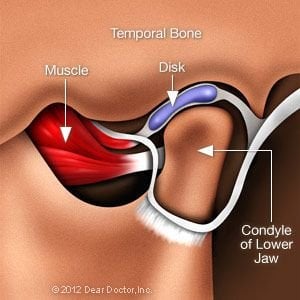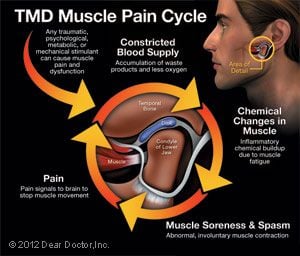TMD/TMJ Treatment
Melanie L. Throne, DDS, PA - General Family Dentist located in Fort Worth, Texas
 If you experience ongoing pain in the area near your ear, your jaw, or the muscles on the side of your face, possibly accompanied by a clicking or popping sound or restricted jaw movement, you may be suffering from TMD — an abbreviation for Temporomandibular disorder. Many people suffer horribly debilitating pain and/or headaches that steal away their spirit and lifestyle. The people who suffer with this will often look sick in their eyes, even have a sunken-in appearance to the face as a result of the pain. Sometimes people incorrectly use the term TMJ to refer to these problems, when in fact TMJ is the abbreviation for the temporomandibular joint — or jaw joint — itself. So while you definitely have a TMJ (two of them in fact), you may or may not have TMD.
If you experience ongoing pain in the area near your ear, your jaw, or the muscles on the side of your face, possibly accompanied by a clicking or popping sound or restricted jaw movement, you may be suffering from TMD — an abbreviation for Temporomandibular disorder. Many people suffer horribly debilitating pain and/or headaches that steal away their spirit and lifestyle. The people who suffer with this will often look sick in their eyes, even have a sunken-in appearance to the face as a result of the pain. Sometimes people incorrectly use the term TMJ to refer to these problems, when in fact TMJ is the abbreviation for the temporomandibular joint — or jaw joint — itself. So while you definitely have a TMJ (two of them in fact), you may or may not have TMD.
TMD, then, describes a group of conditions characterized by pain and dysfunction of the TMJ and/or the muscles surrounding it. It's not always so easy to figure out exactly what's causing these symptoms, but the good news is that most TMD cases resolve themselves with the help of conservative remedies that you can try at home. In fact, it's important to exhaust all such reversible remedies before moving on to anything irreversible, such as bridgework or surgery.
The two TMJs that connect your lower jaw, the mandible, to the temporal bone of the skull on either side, are actually very complex joints that allow movement in three dimensions. On both sides, the lower jaw and temporal bone fit together as a ball and socket, with a cushioning disc in between. Large pairs of muscles in the cheeks and temples move the lower jaw. Any of these parts — the disc, the muscles, the adjacent nerve groupings, or the joint itself — can become the source of a TMD problem. If you are in pain, or are having difficulty opening or closing your jaw, a thorough examination can help pinpoint the problem area; then an appropriate remedy can be recommended.
Causes of TMD
 As with any other joint, the TMJ can be subject to many different orthopedic problems including inflammation, sore muscles, strained tendons and ligaments, and disc problems. TMD is also influenced by genes, gender (women appear to be more prone to it), and age. Physical and psychological stress can also be a factor. In some cases, jaw pain may be related to a more widespread, pain-inducing medical condition such as fibromyalgia (“fibro” – connective tissues; “myo” – muscle; “algia” – pain), trigeminal neuralgia (5th Cranial Nerve), or irritation of some of the other nerves of the head, face, and cranial system. Since the cranial bones are all tethered together by soft tissues as well as boney sutures, it is possible to have various Cranial Strains causing symptoms and compensations, some of which could have been in place since birth or developed over time or after a trauma. These strains are found to be present in all age groups and can often require specific types of physical therapy to address.
As with any other joint, the TMJ can be subject to many different orthopedic problems including inflammation, sore muscles, strained tendons and ligaments, and disc problems. TMD is also influenced by genes, gender (women appear to be more prone to it), and age. Physical and psychological stress can also be a factor. In some cases, jaw pain may be related to a more widespread, pain-inducing medical condition such as fibromyalgia (“fibro” – connective tissues; “myo” – muscle; “algia” – pain), trigeminal neuralgia (5th Cranial Nerve), or irritation of some of the other nerves of the head, face, and cranial system. Since the cranial bones are all tethered together by soft tissues as well as boney sutures, it is possible to have various Cranial Strains causing symptoms and compensations, some of which could have been in place since birth or developed over time or after a trauma. These strains are found to be present in all age groups and can often require specific types of physical therapy to address.
Signs and Symptoms of TMD
Clicking Sounds — Some people with TMD hear a clicking, popping or crunching or crackling sound coming from the TMJ when opening or closing the mouth. This is usually caused by a shifting of the disc inside the joint. Someone standing next to you might even be able to hear it. Clicking by itself is actually not a significant symptom because one third of all people have jaw joints that click, studies show. However, if the clicking is accompanied by pain or limited jaw function — the jaw getting “stuck” in an open or closed position, for example — this would indicate TMD. If your jaw locks, whether open or closed, this is a true medical emergency, and a patient should call Dr. Throne immediately and/or go to the nearest emergency room for treatment.
Muscle Pain — This can be felt in the cheeks (masseter muscles) and temples (temporalis muscles), where the two big pairs of jaw-closing muscles are located. If you feel soreness and stiffness upon waking up in the morning, it's often related to habits such as clenching and/or grinding the teeth. If you have this type of often nocturnal habit, it is critical that Dr. Throne fully assess all possible causes for your particular situation so that you can create a custom treatment plan to identify the root cause and completely address these issues. Sometimes, a custom-made nightguard could be very helpful in decreasing the force applied to your teeth, which will in turn allow your muscles to relax and relieve pressure on your jaw joints. Other times, a more complex approach is required to successfully treat the underlying causative issues. Other self-care remedies are discussed below (please see Relieving the Pain).
Joint Pain — Pain that's actually coming from one or both jaw joints technically would be described as arthritis (“arth” – joint; “itis” – inflammation) of the TMJ. Radiographs (x-ray pictures) show that some people have arthritic-looking TMJs, but no symptoms of pain or dysfunction; others have significant symptoms of pain and dysfunction, but their joints look normal on radiographs. There is no cure for arthritis anywhere in the body, but therapy, splints, or medication can sometimes help relieve arthritic symptoms.
Migraine Headache - Many people suffer terrible headache pain as part of their TMD difficulties. It is critical to help identify these underlying issues and work to resolve symptoms as quickly as possible, even with temporary devices or therapies to address acute symptoms. Unfortunately, many people suffer for years without successful treatment, management, or resolution to these issues using the medical model of care that mostly just offers medicines to treat symptoms. We attempt to identify the cause of the headaches which in turn allows us to resolve the issues rather than merely treating the symptoms.
Relieving the Pain
Once you have been examined, a strategy for treating your condition and managing your pain can be developed. Sometimes a temporary change to a softer diet can reduce stress on the muscles and joints. Ice and/or moist heat can help relieve soreness and inflammation. Muscles in spasm can also be helped with gentle stretching exercises and massage demonstrated by Dr. Throne in the YouTube link below. Non-steroidal anti-inflammatory medications and muscle relaxants can also provide temporary relief. There are many therapeutic adjuncts that are often affordable to help rehabilitate yourself at home. These products are discussed and shown in the other YouTube link below.
Other Treatment Options
Severe TMD cases may require more complex forms of treatment, which might include orthodontics, dental restorations like bridgework, or minor procedures inside the joint such as cortisone injections or lavage (flushing) of the joint. It's rare for major surgery like joint replacement to ever be necessary in a case of TMD. Again, it's important to try the wide range of conservative, reversible treatments available, and give them enough time to work as they almost always prove effective. The first step is an examination at the dental office. To learn more about available treatment options, view this Chart on TMD Therapy







